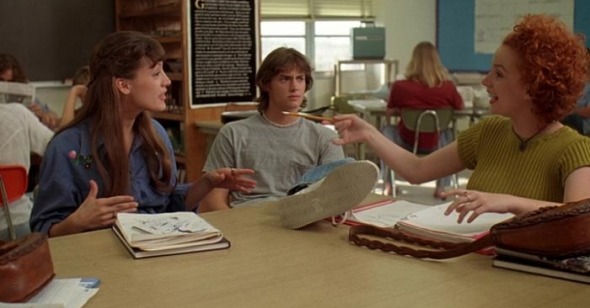That Old Feeling
Elbert Ventura on Dazed and Confused
In my callow teenage years, Dazed and Confused resided in that rarefied pantheon of movies prized less for their artistic merits than for what they said about me and my friends. For our fanboy coterie, movies like Reservoir Dogs, Goodfellas, Miller’s Crossing, and Clerks, among a select few, were nothing less than formative influences on inchoate sensibilities. They were repositories of cool, and nothing more: an inexhaustible supply of lines, gestures, and shots that we threw out at one another as badges of our impeccable taste and budding sophistication. Our ardor was unadulterated and unexamined, and it fueled the presumption that these movies belonged to us alone.
Dazed and Confused seemed particularly fruitful quarry for our indulgence. By the time it came out on video, where it would gain its sizable cult, we were in our senior year of high school, a period that can best be described as a prolonged wallow in proleptic nostalgia. Richard Linklater’s reverie of the last day of school in 1976 was specific in time and place, but it seemed custom-made for us anyway. So much so that, even then, the movie seemed destined to be diminished by its context. Could anything that captured the twilight of high school this lovingly have any resonance beyond our teenage years?
The primary pleasure, then, of reacquainting myself with Linklater’s movie is to discover how utterly unwarranted my condescension has been. Hardly eager to revisit it—the memory of the fiim the sweeter for remaining unseen—viewing Dazed and Confused ten years later affirms my fervor at 17. For a movie that I had damned with the faint praise of being merely “cool” has become something else: a great film.
The curious thing is that nothing about the movie has changed. To paraphrase Matthew McConaughey’s Wooderson, I may have grown older, but it has stayed the same age. It’s a measure of Dazed and Confused’s unpretentious greatness that my deepened appreciation pivots on one of its lessons: that the earliest versions of ourselves are just as valid as the people we are now. Casting a loving eye on our teenage years, Linklater rejects the Olympian vantage our grown-up selves frequently retreat to. Withholding judgment on his characters and their actions, he memorializes our naiveté with fondness, and in the process, revitalizes our idealism, which, we are reminded, need not strictly be associated with youth.
As with much of his oeuvre, Dazed and Confused evinces Linklater’s aversion to conventional structure. Time takes primacy over plot and exerts tyranny over agency: think of the shapeless ramblings of Slacker and Waking Life, or of the melancholy seepage of minutes in Before Sunrise and Sunset. In Dazed and Confused, Linklater eschews a traditional narrative for a gallery of vignettes, all taking place in one memorable day. His parting gift to his characters is that final shot of open road: the movie may end, but time stretches infinitely into the distance for them.
A decade is a long time for ambivalence to take hold. Dazed and Confused bridged the distance from the get-go, those first strains of Aerosmith’s “Sweet Emotion” sending the first pang of nostalgia—a peculiar effect for a song recorded before I was born. Just as strange was the sight of the brilliant ensemble of unknowns, as young as I was back in 1994. Who would’ve thought that the guy playing the bully O’Bannion would one day be known as Ben Affleck? More poignant are the actors seemingly frozen in the movie’s amber: Michelle Burke, Jason London, Rory Cochrane, Sasha Jenson, Cole Hauser, etc. So good here and invisible since, their disappointing career trajectories lace the movie’s celebration of glorious youth with an added touch of wistfulness.
That I responded as strongly as I did to Dazed and Confused a decade later is testament to the movie’s profound understanding of the maturing process. Indeed, the transformation of youthful ardor over time is a central question in Linklater’s cinema. Does it deepen or diminish? Perhaps Linklater’s greatest accomplishment in Dazed and Confused is to encourage us to revisit our youth with nothing but wonder and appreciation. In his generous acceptance of the persons that we were, Linklater offers us the key to growing into adulthood gracefully.
